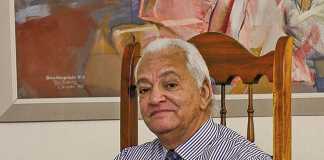In your view, what ha ve bee n the biggest problems the ARC has faced in the last few years?
Managing finances properly is of great concern. In the 2005/06 financial year we received a qualified audit, mainly because of a poor financial asset register. We found that we were underutilising our facilities and personnel. If you go to any one of our farms you will see that. We also struggle with underfunding and a lack of confidence from stakeholders in the ARC’s ability to deliver what they want.
And the biggest successes of the ARC in the past few years?
South African agriculture is where it is because of the ARC. For example, the wine industry exists thanks to the ARC; the maize and grain sector use ARC cultivars; and a lot of the black barley farmers in the Taung area use ARC cultivars. When we had a spate of foot-and-mouth infections, it was the ARC laboratories that were responsible for diagnoses and vaccinations and effectively got rid of the disease.
What is being done about the looming labour crisis at the ARC? When will wage negotiations commence?
There is no crisis at the ARC. Organised labour proposes salary packages and presents an initial proposal which we then take on board and study to determine its affordability. We all know that salaries in agriculture are low, but we also know people need to earn a living wage. We do the best we can with what we can afford. Most of our parliamentary grant goes on salaries. We are more than happy to continue negotiations and reach a joint agreement soon.
According to reports, the ARC is experiencing a massive brain drain because of non-competitive salaries. Is this true? If so, what is the council doing to address this problem?
We have lost some experienced researchers through retirement, but the number of people who resigned during the past year is not significant. We gained roughly the same number as we lost. Our 2 698-member staff dropped by 219 during the last financial year. Of these, 25 passed away, 10 were dismissed, 25 retired, 16 took early retirement, 29 left after their contracts expired, three left for medical reasons, 41 resigned due to inadequate salaries, 43 gave no reason, five left to pursue new careers and seven left for personal reasons. We have since employed 180 new people. In the past, there were rumours that affirmative action policies led to a loss of white research skills.
How will you balance the need to retain research excellence with the official policy of affirmative action?
There is apprehension about this among white males, but on a previous visit to Potchefstroom I explained to our staff that there is no intention to fire people. We just need to balance staff in terms of transformation. There is no pressure to try and get anybody out and no such instruction has been given. Our personnel must reflect the general population, but we also have to be aware of the expertise we have among our staff. We can’t just kick people out; we have to look at the extent to which they contribute and add value. If they are doing their jobs, they have nothing to fear from employment equity.
Has there been a definite shift towards research aimed more at the young developing farming market instead of commercial farming?
Our focus is on black farmers across the spectrum. This is because they are the new entrants, and in many instances they don’t have the support structure to enable them to succeed. But they are also commercially inclined; all farmers are out to make a living from their farming. We deliver many of our results to stakeholders, but it is time to interact more with farmers. We want to make it clear that we are not abandoning commercial white farmers. Part of our strategic plan is to support the complete spectrum of South African agriculture, but we do pay attention to upcoming farmers.
Don’t you think that commercial agriculture should be enjoying more research, especially since it’s expected to compete on a global stage?
In the past we focused too much on applied research. Now we should look towards investing in intellectual capital for fundamental research to generate the new blue-sky knowledge that is required. We can’t do this in isolation; we have to recruit well-known scientists and engage with universities for such research. We have recently signed a formal agreement with the Medical Research Council to collaborate on different projects addressing food safety, nutrition and production.
How good is the ARC’s relationship with the various commodity organisations that contract the institution to do research for them?
These relationships have improved significantly, and we have met with a broad spectrum of organisations to establish their concerns and to give them a sense of security. We want them to understand that we are in this together.
There is talk of massive restructuring within the ARC. Is this true?
The restructure is not a mystery. We are addressing the underutilisation of our resources and giving the council a new strategic direction. Our objective is to provide more efficient service.
How are your research programmes decided on, and what are some of the most pressing research programmes underway at the ARC?
Research programmes are identified based on the needs of the customer, meaning they are demand-led. For example, when the citrus industry approached us about insect infestation we developed the sterile insect technique project to create a pest-free zone which would greatly benefit exports. We also engage with shareholders, such as the Department of Agriculture, to identify the most pressing issues. We are currently busy with research on classic swine fever and footand- mouth disease. We prioritise research according to need.
What is your view on the future of South African agriculture?
When looking at economic aspects, one can’t help but be pessimistic. But as far as the ARC is concerned, there are tremendous opportunities. We are at a point where a lot of new technologies are being developed, especially where global climate change is concerned. We see an opportunity to add value and to provide the information people need. We have provided data to the task team of the biofuel project to identify land-use projects and to research the breeding of new maize cultivars for this purpose.
Is there a message you would like to convey to your constituency – the farmers?
The ARC is here to promote research and technology; we are not here to abandon you. We hope to add value to the customers of the ARC.













